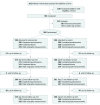Effect of Parental Counseling on Infants' Healthy Sleep Habits in Brazil: A Randomized Clinical Trial
- PMID: 31860110
- PMCID: PMC6991232
- DOI: 10.1001/jamanetworkopen.2019.18062
Effect of Parental Counseling on Infants' Healthy Sleep Habits in Brazil: A Randomized Clinical Trial
Abstract
Importance: Poor sleep during early childhood is associated with adverse outcomes, including obesity, cognitive impairment, and mental and behavioral disorders.
Objective: To assess the efficacy of an educational intervention in the promotion of nighttime sleep duration.
Design, setting, and participants: This single-blind, intent-to-treat randomized clinical trial included participants in Pelotas, Brazil, aged 3 months who were followed up until age 24 months. Eligibility criteria included healthy infants aged approximately 3 months who slept less than 15 hours per 24 hours. Infants were randomized to the intervention group or control group.
Interventions: Information on sleep characteristics, improvements in the environment, establishment of a nighttime sleep routine, and waiting before attending nocturnal awakenings was delivered to mothers in the intervention group by trained home-visitors at baseline. The intervention group received a telephone call on the first and second day after the intervention and a home visit on the third day after the intervention. The intervention's content was reinforced at health care visits for ages 6 months and 12 months. Mothers allocated to the control group were counseled on the benefits of breastfeeding for the mother's and child's health and given written material with content on breastfeeding.
Main outcomes and measures: Nighttime sleep duration was measured by interview and actigraphy at baseline and ages 6, 12, and 24 months and diaries at baseline and age 6 months. At ages 3 and 6 months, nighttime sleep self-regulation was calculated by subtracting nighttime sleep duration recorded by actigraphy from nighttime sleep duration recorded in the diaries and at ages 12 and 24 months by subtracting nighttime sleep duration recorded by actigraphy from nighttime sleep duration obtained by interview.
Results: Among 1812 mother-infant dyads invited to participate, 798 met the inclusion criteria and 586 agreed to participate. The intervention group included 298 infants (154 [52.9%] boys), and the control group included 288 infants (164 [58.2%] boys). At age 6 months, mean (SD) nighttime sleep duration recorded in diaries was 9.80 (1.85) hours in the intervention group and 9.49 (2.07) hours in the control group, a difference of 19 minutes longer for the intervention group. At age 12 months, mean (SD) nighttime sleep duration based on the Brief Infant Sleep Questionnaire was 8.43 (1.35) hours in the intervention group and 8.52 (1.35) hours in the control group, a difference of 5 minutes shorter for the intervention group. At age 24 months, compared with information from the interview, actigraphy records showed that children in the intervention group stayed awake at night without signalizing for a mean (SD) of 0.52 (2.52) hours, whereas children in the control group stayed awake at night without signalizing for a mean (SD) of 0.23 (2.43) hours. There were no statistically significant difference between groups in any of the sleep parameters investigated.
Conclusions and relevance: This randomized clinical trial found that the educational intervention did not achieve longer nighttime sleep duration among infants in the intervention group.
Trial registration: ClinicalTrials.gov identifier: NCT02788630.
Conflict of interest statement
Comment in
-
An Educational Intervention for Improving Infant Sleep Duration-Why Won't You Sleep, Baby?JAMA Netw Open. 2019 Dec 2;2(12):e1918061. doi: 10.1001/jamanetworkopen.2019.18061. JAMA Netw Open. 2019. PMID: 31860101 No abstract available.
References
Publication types
MeSH terms
Associated data
Grants and funding
LinkOut - more resources
Full Text Sources
Medical
Miscellaneous


